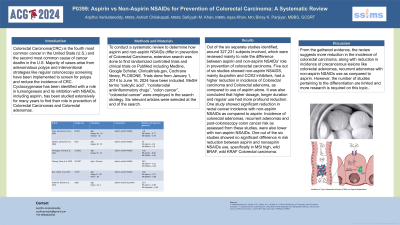Sunday Poster Session
Category: Colorectal Cancer Prevention
P0399 - Aspirin vs Non-Aspirin NSAIDs for Prevention of Colorectal Carcinoma: A Systematic Review of Randomized Control Trials
Sunday, October 27, 2024
3:30 PM - 7:00 PM ET
Location: Exhibit Hall E

Has Audio

Arpitha Venkatareddy, MBBS
Daily Rounds
Chintamani, Karnataka, India
Presenting Author(s)
Arpitha Venkatareddy, MBBS1, Ashish Chilakapati, MBBS2, Safiyyah M. Khan, MBBS3, Aqsa Khan, MD4, Binay K. Panjiyar, MBBS5
1Daily Rounds, Chintamani, Karnataka, India; 2GIMSR Medical College, Pensacola, FL; 3Bangalore Medical College, Bangalore, Karnataka, India; 4Parkview Health Center, Fort Wayne, IN; 5Harvard Medical School, Boston, MA
Introduction: Colorectal Carcinoma(CRC) is the fourth most common cancer in the United States and the second most common cause of cancer deaths in the U.S. Majority of cases arise from adenomatous polyps and interventional strategies like regular colonoscopy screening have been implemented to screen for polyps and reduce the incidence of CRC. Cyclooxygenase has been identified with a role in tumorigenesis and its inhibition with NSAIDs, including aspirin, has been studied extensively for years to find their role in prevention of Colorectal Carcinomas and Colorectal adenomas.
Methods: To conduct a systematic review to determine how aspirin and nonaspirin NSAIDs differ in prevention of Colorectal Carcinoma, extensive search was done to find randomized controlled trials and clinical trials on PubMed including Medline, Google Scholar, Clinicaltrials.gov, Cochrane library, PLOSOne. Trials done from January 1, 2014 to June 16, 2024 have been included. MeSH terms “salicylic acid”, “nonsteroidal antiinflammatory drugs”, “colon cancer”, “colorectal cancer” were employed in the search strategy. Six relevant articles were selected at the end of the search.
Results: Out of the six separate studies identified, around 327,231 subjects involved, which were reviewed mainly to note the difference between aspirin and nonaspirin NSAIDs' role in prevention of CRC. Five out of six studies showed nonaspirin NSAIDS, mainly ibuprofen and COX2 inhibitors, had a higher reduction in incidence of CRC and Colorectal adenoma, as compared to use of aspirin alone. It was also concluded that higher dosage, longer duration and regular use had profound reduction. One study showed significant reduction in rectal cancer incidence with non-aspirin NSAIDs as compared to aspirin. Incidence of colorectal adenomas, recurrent adenomas and post-colonoscopy colon cancer risk as assessed from these studies, were also lower with non-aspirin NSAIDs. One out of the six studies showed no significant difference in risk reduction between aspirin and nonaspirin NSAIDs use, specifically in MSI high, wild BRAF, wild KRAF CRC.
Discussion: From the gathered evidence, the review suggests more reduction in the incidence of colorectal carcinoma, along with reduction in incidence of precancerous lesions like colorectal adenomas, recurrent adenomas with nonaspirin NSAIDs use as compared to aspirin. However, the number of studies pertaining to the differentiation are limited and more research is required on the topic.
Disclosures:
Arpitha Venkatareddy, MBBS1, Ashish Chilakapati, MBBS2, Safiyyah M. Khan, MBBS3, Aqsa Khan, MD4, Binay K. Panjiyar, MBBS5. P0399 - Aspirin vs Non-Aspirin NSAIDs for Prevention of Colorectal Carcinoma: A Systematic Review of Randomized Control Trials, ACG 2024 Annual Scientific Meeting Abstracts. Philadelphia, PA: American College of Gastroenterology.
1Daily Rounds, Chintamani, Karnataka, India; 2GIMSR Medical College, Pensacola, FL; 3Bangalore Medical College, Bangalore, Karnataka, India; 4Parkview Health Center, Fort Wayne, IN; 5Harvard Medical School, Boston, MA
Introduction: Colorectal Carcinoma(CRC) is the fourth most common cancer in the United States and the second most common cause of cancer deaths in the U.S. Majority of cases arise from adenomatous polyps and interventional strategies like regular colonoscopy screening have been implemented to screen for polyps and reduce the incidence of CRC. Cyclooxygenase has been identified with a role in tumorigenesis and its inhibition with NSAIDs, including aspirin, has been studied extensively for years to find their role in prevention of Colorectal Carcinomas and Colorectal adenomas.
Methods: To conduct a systematic review to determine how aspirin and nonaspirin NSAIDs differ in prevention of Colorectal Carcinoma, extensive search was done to find randomized controlled trials and clinical trials on PubMed including Medline, Google Scholar, Clinicaltrials.gov, Cochrane library, PLOSOne. Trials done from January 1, 2014 to June 16, 2024 have been included. MeSH terms “salicylic acid”, “nonsteroidal antiinflammatory drugs”, “colon cancer”, “colorectal cancer” were employed in the search strategy. Six relevant articles were selected at the end of the search.
Results: Out of the six separate studies identified, around 327,231 subjects involved, which were reviewed mainly to note the difference between aspirin and nonaspirin NSAIDs' role in prevention of CRC. Five out of six studies showed nonaspirin NSAIDS, mainly ibuprofen and COX2 inhibitors, had a higher reduction in incidence of CRC and Colorectal adenoma, as compared to use of aspirin alone. It was also concluded that higher dosage, longer duration and regular use had profound reduction. One study showed significant reduction in rectal cancer incidence with non-aspirin NSAIDs as compared to aspirin. Incidence of colorectal adenomas, recurrent adenomas and post-colonoscopy colon cancer risk as assessed from these studies, were also lower with non-aspirin NSAIDs. One out of the six studies showed no significant difference in risk reduction between aspirin and nonaspirin NSAIDs use, specifically in MSI high, wild BRAF, wild KRAF CRC.
Discussion: From the gathered evidence, the review suggests more reduction in the incidence of colorectal carcinoma, along with reduction in incidence of precancerous lesions like colorectal adenomas, recurrent adenomas with nonaspirin NSAIDs use as compared to aspirin. However, the number of studies pertaining to the differentiation are limited and more research is required on the topic.
Disclosures:
Arpitha Venkatareddy indicated no relevant financial relationships.
Ashish Chilakapati indicated no relevant financial relationships.
Safiyyah Khan indicated no relevant financial relationships.
Aqsa Khan indicated no relevant financial relationships.
Binay Panjiyar indicated no relevant financial relationships.
Arpitha Venkatareddy, MBBS1, Ashish Chilakapati, MBBS2, Safiyyah M. Khan, MBBS3, Aqsa Khan, MD4, Binay K. Panjiyar, MBBS5. P0399 - Aspirin vs Non-Aspirin NSAIDs for Prevention of Colorectal Carcinoma: A Systematic Review of Randomized Control Trials, ACG 2024 Annual Scientific Meeting Abstracts. Philadelphia, PA: American College of Gastroenterology.
